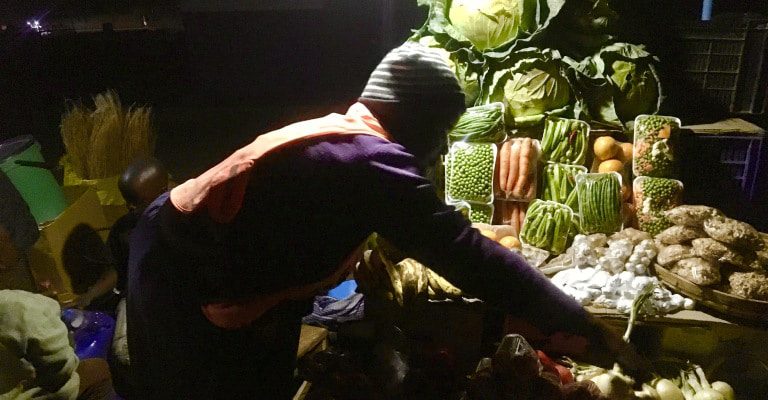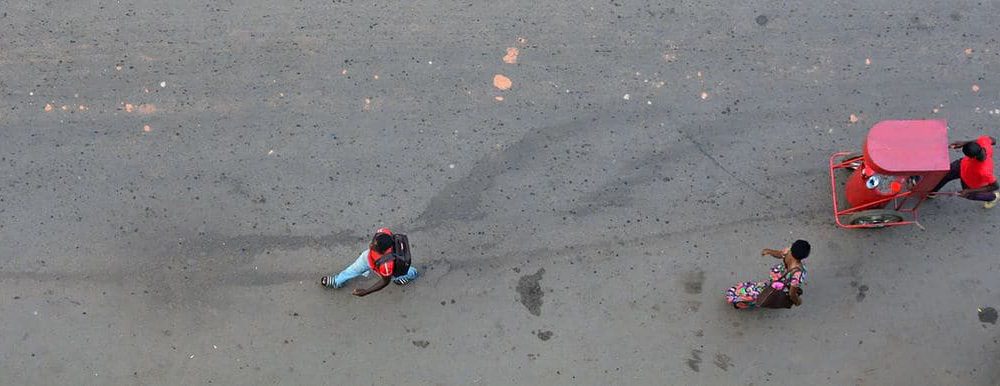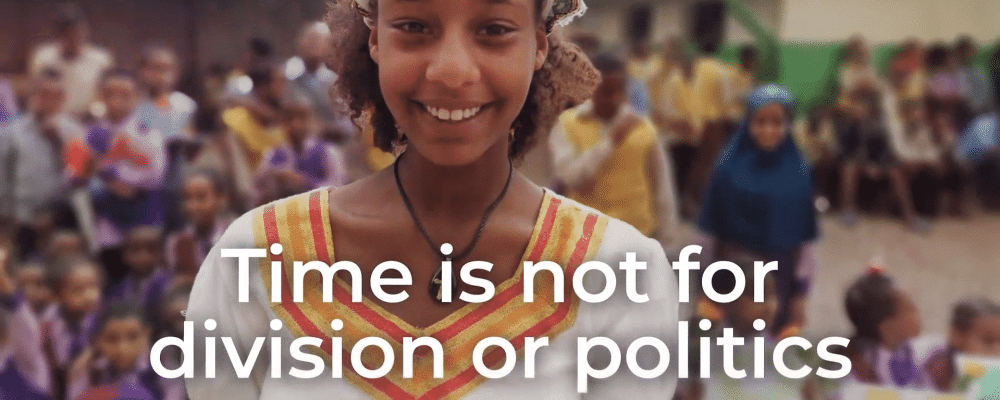
New York (TADIAS) — Last week Professor Lemma Senbet, an Ethiopian-American financial economist and the William E. Mayer Chair Professor at University of Maryland, moderated a timely webinar titled ‘COVID-19 and African Economies: Global Implications and Actions.’ The well-attended online conference — hosted by the Center for Financial Policy at University of Maryland Robert H. Smith School of Business on Friday, April 24th — featured guest speakers from the International Monetary Fund (IMF) as well as the World Bank who addressed “the global implications of the COVID-19 economic impact on developing and low-income countries, with Africa as an anchor.”
In the following Q&A with Tadias Prof. Lemma, who is also the immediate former Executive Director of the African Economic Research Consortium based in Nairobi, Kenya, explains the worldwide economic fallout of the Coronavirus pandemic and its impact on the African continent, including Ethiopia.
TADIAS: Prof Lemma, thank you for your time. You just finished moderating a webinar on COVID-19 & African Economies. Can you give us a quick recap of the online conference?
Professor Lemma W. Senbet: The webinar featured two high level policy experts and officials from two of our flagship international institutions: Dr Domenico Fanizza who is a member of the IMF Executive Board, and Dr Rabah Arezki, World Bank MENA Chief Economist.
Let me first give you a context for the webinar. We often hear about the dark side of Africa in international news media. Yes, Africa has its dark side. African countries face enormous economic and social challenges, but on the bright side, Africa has maintained sustained growth over the last 25 years, with some seven countries having been among the fastest growing in the world. This is not accidental. It is an outcome of years of massive reforms of both real and financial economies in Africa.
Now enter Africa and COVID-19, the greatest global crisis of the century. This is foremost health crisis of epic proportions. It has like-wise resulted in economic crisis of epic proportions, far exceeding the global financial crisis (a decade ago) and touching every country and, in fact, every human being. The webinar focused on the economic dimensions facing low income countries, with a focus on Africa.
After a slow start in Africa, COVID-19 has been spreading rapidly throughout the continent. The adverse economic consequences are already being felt. This is in part due to negative economic spillovers resulting from the economic hits to Africa’s main trading partners: EU, China, U.S.
The resource rich countries, particularly Nigeria, Angola, South Africa, South Sudan, etc., have been badly hit.. Moreover, similar to the other countries, such as U.S., African countries have begun implementing mitigation and containment mechanisms to cope with COVID-19.
Therefore, large portions of African economies are shut down to prevent mobility and spread of the virus. Major cities in this regard include Lagos, Johannesburg, Harare, Accra, and Addis, Nairobi.
TADIAS: What specific issues were discussed at the webinar?
Prof Lemma: The webinar was intended to unpack the key economic issues, and for the earlier part, it dealt with global interconnectedness which, and in this context as to why Africa and low income countries matter to the rest of the globe. Hearing this from speakers who are highly placed at the global institutions and reassurance for global partnership was welcome. The webinar provided a broad assessment of economic devastation on low income countries, particularly African countries, for lockdowns, shutdowns, etc. – responses which are now widely adopted globally, including Africa.
While the advanced countries have the capacity to mitigate the adverse economic impact on livelihoods, small businesses, services, through massive government rescue programs, low income countries have no commensurate resources. The webinar discussed national and global responses to the plight of African economies; particularly the respective responses to-date of key global and regionals institutions: IMF, World Bank, UNDP, AfDB, etc.
The other issue the webinar addressed was exit strategy. The more advanced countries are easing restrictions to reopen their economies. However, low income and fragile states cannot afford to do that in view of low capacity for large-scale testing, weak health infrastructure, and relative absence of social safety nets. Even more disturbingly, economies would be further devastated with continuing lockdowns and shut downs. The speakers grappled with the health and economic consequences of relaxing restrictions, and if there is a way out or exit strategies for African countries.
The second part of the webinar was interactive based on the questions and commentaries from the participants. It was a global audience.
TADIAS: The International Monetary Fund (IMF) has stated that “the coronavirus pandemic is causing the worst economic downturn since the Great Depression of the 1930s” and that “the global economy will shrink by 3 percent this year.” What does that mean for Africa?
Prof Lemma: As Domenico Fanizza, member of the IMF Executive Board, mentioned, the IMF expects the GDP for Sub-Saharan Africa to contract by 1.6 percent in 2020. This is only at a gross level without accounting for population size. The per capita income is expected to decline by 4%. This is very disappointing to say the least. This hugely negative news has come after about two decades of sustained economic growth in the region, with several countries having been among the fastest growing in the world (Ethiopia included). There have been substantial improvements in living conditions and reduction in poverty. All that is now threatened. We hope the recovery to be fast post COVID-19, but it would be very difficult to recapture what is lost even we experience a V-shaped growth. Some are actually bracing for the W shaped growth, which is really scary.
TADIAS: Given the forecast that over the next two years worldwide output will be $9 trillion less than expected before the crisis, does the financial impact of the pandemic differ from region to region within the continent? And, if so, how?
Prof Lemma: Yes. Europe has been hit the most, with an expected 7.5 per cent reduction of GDP in 2020, as also mentioned by our panelist from the IMF. COVID-19 broke out when the region’s growth had already slowed down; countries, such as Italy, France, Spain, and UK are very likely to be hugely affected. The US economic contraction is expected to be close to 5 percent, but already the number of unemployment filings has reached about 26.5 million (on April 24, the date of the webinar), and it is still rising. This is devastating viewed from the baseline (pre-COVID-19) full employment only a month ago. Asia is the only continent that is expected to grow (1 percent in 2020), but more slowly than expected a few months ago. The relatively lower economic hit is attributable to an early and prompt actions against the spread of the virus.
There are also substantial variations within Africa. COVID-19 showed up in the wake of the other headwinds the region is already experiencing – globally: China-US trade tensions and Brexit; internally, the challenges include weak health infrastructure; non-existent safety nets in most of these countries; commodity/oil price slump; and heavy indebtedness in terms of very high levels of debt (scaled by GDP) and high debt servicing costs. This is really very bad news for the oil-rich countries, such as Nigeria, Angola, South Africa, South Sudan, etc.
TADIAS: What’s the expected effect of the pandemic on economic activity in Ethiopia?
Prof Lemma: Ethiopia is not immune, of course. The impact will be major. Based on the IMF estimates, growth is expected to slow down dramatically from 9 percent to 3 percent in 2020. Ethiopia was among those countries which were immediately and adversely impacted by COVID-19 even at the inception of the spread of the virus. This resulted from negative spillovers from the main trading partners in EU, Middle East, China, and even US. The hospitality industry, including hotels, tourism, travel, were immediately affected. So was trade volume – both exports and imports. So were remittances. Moreover, the fiscal deficit will be greatly exacerbated in view of government expenditures in coping with the health crisis as well as rescue attempts to protect economic livelihoods and micro enterprises, as well as small and medium enterprises. These have been engines of employment creation, and should be protected. The large informal economy poses both risk of health epidemics and loss of incomes (already at very low levels) threatening those at the low end to devolve into poverty. That is why any government interventions, including global support for Ethiopia, should be multilayer, including the protection of the most vulnerable, as well as microenterprises and SMEs. The other side of the coin is that there are microfinance institutions which fund small businesses, and they should also be brought into the picture for government responses. They will fail if there is widespread default at the level of small businesses, particularly microenterprises. The Friday webinar was, in part, intended for enhancement of global attention to the plight of African economies and to the global responses for the mutual benefit – global health and economic health.
TADIAS: Last month both The World Bank and IMF issued a joint statement to the G20 concerning debt relief for developing countries and calling “to suspend debt payments from IDA countries that request forbearance.” What are your thoughts on this proposal? Does it go far enough to address the looming debt crisis?
Prof Lemma: Many African countries were already on the verge of looming debt crisis due to build-up of high levels of borrowing domestically and internationally. I cannot see much worse time for these countries to get caught up with the COVID-19 crisis. The international initiatives coming from G20 and international financial institutions are definitely welcome, This should be viewed in the broader global interest and interconnectedness which are now reinforced by COVID-19. In this connection, what is not getting as much attention is debt owed to private international creditors. The good news is that many African countries began accessing international credit markets (e.g., Eurobonds issuance) at arms length. In the earlier HIPC era, these countries were rationed out of the markets. Now they are also able to access diverse sources of borrowing. However, this has become a double-edged sword, particularly in troubled times, such as the one we are facing. It would be very difficult to restructure agreements among diverse set of creditors. While non-private creditors are engaged in debt restructuring and reliefs (at least in the short term by rescheduling payments, etc), I have not witnessed yet that such initiatives are taking place with respect to private creditors. There should be a concerted global effort to bring them to the table to resolve the looming debt crisis in an efficient and mutually beneficial manner. Without that I am worried that African countries, except the very few, such as South Africa, may get rationed out again in the future from the private credit markets.
TADIAS: Looking at the future, what are some of the main institutional changes and solutions that need to be implemented on the global level in order to avoid similar disasters from occurring again?
Prof Lemma: I will be brief here. I am taking a pro-globalization view. I would not be surprised, though, if anti-globalization forces emerge from COVID-19. My view is that, given a very strong reinforcement and reawakening by COVID-19 about global interconnectedness, policies must be globally coordinated both at the health and economic levels. COVID-19 has not spared anyone. As they say, we are in it together!
TADIAS: Thank you again Prof Lemma and we wish you all the best. Stay safe and healthy.









